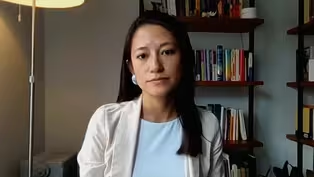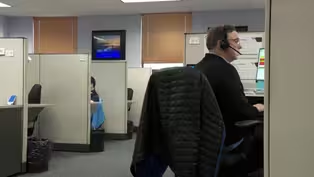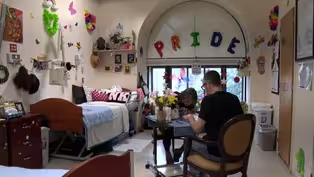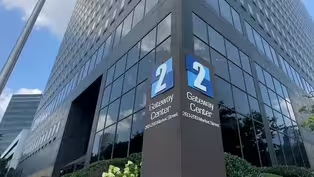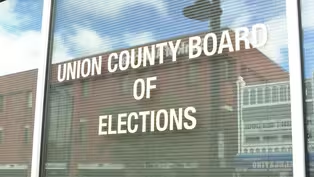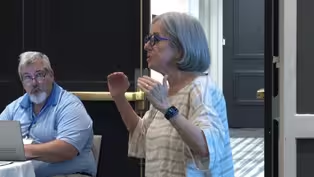NJ Spotlight News
NJ Spotlight News: July 18, 2023
7/18/2023 | 26m 46sVideo has Closed Captions
Watch as the NJ Spotlight News team breaks down today's top stories.
We bring you what's relevant and important in New Jersey news, along with our insight. Watch as the NJ Spotlight News team breaks down today's top stories.
Problems playing video? | Closed Captioning Feedback
Problems playing video? | Closed Captioning Feedback
NJ Spotlight News is a local public television program presented by THIRTEEN PBS
NJ Spotlight News
NJ Spotlight News: July 18, 2023
7/18/2023 | 26m 46sVideo has Closed Captions
We bring you what's relevant and important in New Jersey news, along with our insight. Watch as the NJ Spotlight News team breaks down today's top stories.
Problems playing video? | Closed Captioning Feedback
How to Watch NJ Spotlight News
NJ Spotlight News is available to stream on pbs.org and the free PBS App, available on iPhone, Apple TV, Android TV, Android smartphones, Amazon Fire TV, Amazon Fire Tablet, Roku, Samsung Smart TV, and Vizio.
Providing Support for PBS.org
Learn Moreabout PBS online sponsorshipthe race to see Tim King Junior is already shooting up.
The election is more than a year away.
>> My campaign will be the dominant force.
>> Plus, a 988 lifeline.
A year after the National suicide prevention change their number, many remain unaware how easy it is to connect with help.
>> Not a lot of people know about 988.
>> For residents live in at Newark's Broadway house, safe haven for people living with HIV and AIDS.
>> I was ready to give up, but I came here, they show you love, compassion.
>> A much-needed history lesson.
A majority of states do not require teachings of the Holocaust, but here in New Jersey educators gathered to learn how to integrate it into the classroom.
>> NJ Spotlight News starts right now.
New Jersey Realtors, the voice for real estate in New Jersey.
More information is online at NJrealtor.com.
And By the PSEG foundation.
♪ >> This is NJ Spotlight News with Briana Vannozzi.
Raven: Good evening and thank you for being with us.
There are still more than a year to go before the next congressional elections, but New Jersey's 14 member delegation has already raised $43 million.
Nearly a $1 million of that coming from this latest quarter.
One race could shape up into a cost like -- costly fight in district seven.
But can they flip this now read district blue?
>> My campaign will be the dominant force and everyone else will have to deal with that reality.
Reporter: She is feeling confident in a strong start in her race against time King Junior -- Tim Kaine Junior.
>> This race is about women's rights, this race is about democracy.
It is about the environment and the economy.
He should not be in office, he is not doing his job.
Reporter: She is a progressive and believes her message will resonate in this last true swing district in the state even though she has been on the left of many social issues, even calling out Governor Murphy at times.
>> Are you too progressive for this district?
>> I am not too progressive for this district.
Anti-corruption holds both parties accountable.
Reporter: She will have to make it through the primary first.
>> I have a track record of working across the I/O.
And working in competitive districts.
When I got elected, I beat a 20 year incumbent Republican machine.
It take someone that understands how to win in a red district.
Reporter: Democrats need to flip five seats to retain control of the house and they are hopeful district seven can be one of them, especially because the company has not done much.
-- incumbent has not done much.
>> The name recognition is a double-edged sword.
I think people are starting to learn what Junior is all about.
He talks like he is a moderate, but votes like Marjorie Taylor Greene.
Reporter: Before entering this race, he was taken on Bob Melendez.
This might be the easier big-name to beat.
>> We are going to make a case based on experience, based on people that have run races and convinced moderates and Republicans to vote, Democratic.
>> I think he got 2500 votes to be mayor.
I know this district by heart.
It is where I grew up and it is where I am from.
Reporter: There is still the possibility that the former New Jersey senator will jump in, though he seems to enjoy keeping everyone guessing.
>> I have been a leader my entire life on environmental protection, women's rights, animal welfare, but I am so much involved right now with what is going on in New Jersey.
I can wait until by the end of the gear to make my decision.
Reporter: The Democrats will battle for ballot advantage.
Guess it will also get the fundraising advantage to try to catch up to kane.
Even with the partyline and heavy pocketbooks, Democrats are in a district that was redrawn to all but guarantee that Kane will win.
>> Both of these candidates know how to press the conversation.
Either way, he will be facing a very spirited race.
Reporter: A race that will be the most-watched in the state next year.
Raven: It has been one year since the nationwide launch of the new 98 suicide lifeline.
The new number replace the old one, making it more accessible for individuals in crisis to get the help they need.
Data shows calls to the hotline have increased since the change, but a new survey also finds many people still do not know about the service and that misconceptions about the hotline process.
Our Senior correspondent reports.
Reporter: A lot more people dialed 988, America's new three digit suicide prevention lifeline in its first year of operation than the old 10 digit phone number.
That is good news with depression and anxiety rising.
The objective is to route mental health cases to train counselors.
>> With the pandemic, a lot of individuals were experiencing a crisis as it relates to their own health and wellness.
We are happy to see there has been an increase and that individuals are calling in to get support.
Reporter: Outreach to New Jersey's five lifeline centers is anonymous.
988 calls climbed 20% in New Jersey.
The system is still relatively unknown according to a recent survey by the national alliance on mental illness.
>> We found not a lot of people know about 988.
Only about 17% of Americans are familiar with it.
If they had a loved one who was in the mental health crisis, they would not know what to do to help them.
Reporter: She says people over 50 and communities of color or least familiar with 988 and some color still experience confusion, with many expecting a 911 type of response.
And that may prevent some people from reaching out.
>> Fear of immigration services, someone has a history of incarceration and they are afraid to call for the poor because they are not sure if that would come back to them.
Sometimes it could be related to just domestic violence issues.
Reporter: Each case must get assessed individually.
>> Police and emergency services are utilized extremely sparingly and only under conditions where the limits of confidentiality apply, one of which is if there is immediate danger.
Reporter: Counselors generally refer callers to local resources.
The system does transfer calls out-of-state to cut down on wait times, by 83% of calls were handled locally in New Jersey.
A reduced time spent on hold to just 29 seconds.
>> When you are in crisis, I think time gets distorted.
20 seconds might feel like an eternity.
Reporter: He had New Jersey's only 24/7 call center at Rutgers.
New Jersey is beefing up lifelines with a $10 million investment.
>> To increase our capacity for calls, our capacity for texts and our capacity for chats.
Reporter: She says New Jersey is also ramping up mobile response bands, each equipped with two mental health experts.
>> We will go to people's homes are where the individual is to provide that face-to-face support.
Reporter: That program launches by the end of this year.
I am Brenda Flanagan.
Raven: Newark's Broadway House serves as the state's only specialized care facility for people living with HIV and AIDS.
Two residents recovering from help conditions created a bond and were able to move in with each other thanks to a recent law that makes it illegal to discriminate against the LGBTQ community.
Melissa Rose Cooper reports from the facility as part of our ongoing series that focuses on justice, poverty and economic opportunity.
>> After all the years I've been on the streets and the stuff I went through with drugs, alcohol, prostitution, I do not want that anymore.
I want to be able to be a civilian and live next door to my neighbor.
Reporter: A dream he could finally see coming true thanks to help from Broadway house, New Jersey's only specialized care facility for people living with HIV and AIDS.
Joey, who has been living with AIDS with -- 531 years, came to Broadway house after being diagnosed with pneumonia.
>> I was about 130 pounds, six.
I have not been on medication.
Reporter: But now things are looking up, something that is possible because of the love and compassion from his roommate.
>> We realized we had a lot in common and that would be the arts.
We both really enjoy crafts and drawing.
That kind of brought us together.
I have the same type of pass.
I've been in recovery for quite some time, but I was not always.
I used to use drugs.
It has been almost 30 years.
I also prostituted back in those days.
I said, he is a queen like me.
What difference would it make?
Reporter: Now the friends are making history, becoming the first mixed sex roommate set Broadway house.
-- roommates at the Broadway house.
Given them this choice is another way to make sure the facility is inclusive while making sure to get residents back on their feet.
>> To try to care for people in a more home care setting and bring together the professional staff that can address specifically those living with HIV.
The medications are complex, the illness is complex.
So we bring together a team of qualified individuals, physicians, nurse practitioners, drug counselors and psychiatrists to come together to address the needs of our residents.
>> A has been like being home.
Sometimes you do not have to be blood to be family.
Reporter: Now they are hoping their story will inspire others, even decorating the room to invite them.
>> We are hoping we can advocate for hope and life.
Reporter: Creating an everlasting bond that will last beyond these walls.
Raven: In our spotlight on business report, more electric vehicles are coming to New Jersey roads.
It is all part of the new proposal by the Murphy administration that would phase out the sale of new gasoline-powered vehicles by 2035.
The proposal aims to reduce the pollution causing global warming by electrifying transportation in New Jersey.
The single largest source about pollution in the state.
If adopted, the role blood ramp up sales requirements for a new passenger vehicle cars and light trucks to primarily electric goals over the next decade with a 100% EB sales requirement by 2035.
Publishing the proposed rule by August 21 and adapting it by the end of the calendar gear would trigger the sales requirement to kick in by the model year 2027.
Last week, the state renewed a popular incentive program that offers up to $4000 for the purchase of new electric cars as well as incentives for installing charges in homes, apartments.
Check out Tom Johnson's article on njspotlightnews.org For more on the new rules and regulations.
A story we have been following closely is the costly real estate deal for and -- NJ Transit's new headquarters.
The transit agency will spend more than $440 million over 25 years to run to eight floors of Two Gateway centering new work.
Moving its operations from the building it owns just down the street.
NJ Transit said its current headquarters needed $120 million in renovations and the lease agreement provides the best value for taxpayers.
Controversy began when reporting revealed the building was the most expensive option and that discussions with the building owner began before the agency started soliciting bids.
Republican lawmakers are calling for hearings over a lack of transparency and asking why the agency chose the most expensive option as it faces financial woes.
NJ Transit expects to occupy the new headquarters by the end of 2024.
Here is how markets closed today on Wall Street.
Housing is among the most powerful drivers of school segregation.
One solution to segregation is to make the states housing policies better reflect the racial diversity and economic diversity of the population.
As part of the segregated series, are reporter Karen Yi takes a look at Franklin Township in Somerset County as a model of how embracing affordable housing has led to better schools.
Explain what Franklin Township is doing differently when it comes to affordable housing.
>> Franklin Township has been a model for embracing mandating that all towns provide opportunities for affordable housing.
Just that they should have zoning rules that will bring [INDISCERNIBLE] Franklin stands out because they have kept pace with this doctrine over time.
Raven: I think it is really important to explain how that has led to more diverse schools.
>> The schools are very diverse.
It is diverse in many ways, not just racially, but socially economically as well.
The district itself has embraced this diversity.
They have passed a antiracism policy, and you can see it trickle down both in big ways, but also in small ways in how teachers are interacting with their students on a day-to-day basis.
Raven: I think it is important to explain to viewers and especially those who may not understand fully, how does segregation really affect the student experience?
>> I think what was interesting was asking students themselves.
What is an integrated school and how does it affect your experience?
Sometimes students can see more clearly than adults.
They were saying, I walk into a classroom and I see somebody that looks like me.
For somebody who was a young black child or Latino child, happened that reflected throughout the course of your education is confidence building.
Raven: While this seems like a win-win for everyone, why has there been pushback or no change in other towns?
>> This is one tool that essentially said almost 50 years ago we are required every Township to provide affordable housing.
I wanted to analyze the impact.
There are many reasons why people move into places.
Mount Laurel was supposed to diversify housing and also integrate schools and integrate communities.
We are really starting to see a change where they are moving through the courts.
We saw happening in Mount Laurel.
Policy and politics got involved and this was not enforced as they should have.
Now we are seeing it back in the courts.
I think we will start seeing the doctor and enforced as they should have been 50 years ago.
-- doctrine enforced as it should have been 50 years ago.
Raven: Thank you so much.
Excellent reporting.
Check out her full article on the entire segregated series that includes reporting from a dozen other newsrooms across the state by heading to njspotlightnews.org.
Amid rising reports of anti-Semitism, Holocaust scholars say it is more important now than ever for teachers to teach Holocaust history.
Here in New Jersey, districts are not required to follow specific curriculum, but the Holocaust is required to be taught in some form.
Ted Goldberg went to visit the West Orange Jewish foundation for the righteous that is holding a summer seminar on how to teach the Holocaust across the country in classrooms.
Reporter: Students have a ways to go in learning about the Holocaust.
>> Their knowledge about the Holocaust is superficial.
They do not really understand the nuances of the Holocaust.
They do not understand what led up to the Holocaust, how it was able to happen.
>> They have the basics and the history, but they do not have the stories.
Reporter: The Jewish foundation for the righteous is now teaching teachers how to teach the Holocaust.
They brought in scholars.
They are explained in people rescued Jews and how atypical their stories were.
>> Christians who helped Jews and Muslims, they were killed.
There were men and women who said not on my watch, but they were the precious few.
Reporter: 28 teachers came from nine states.
>> There were a number of stories that I had no knowledge of, like the medical, we had a doctor that talked to us about the medical experiments and the sterilization programs that they had for the disabled.
Reporter: The deeper dive we are taken here is educating me and giving me sources I can implement in my current curriculum to expand and go deeper into the information or the questions that students have had in the past.
>> I am getting strategies other teachers have used.
We are also meeting with language arts teachers as well who suggested we keep in touch and do a cross-country book club.
>> There are so many valuable tools.
We opened a center in our high school and I am gathering as much information as I can.
Reporter: These teachers hope better instruction about the Holocaust will make their students more understanding of the Jewish faith and less likely to be anti-Semitic, as anti-Semitic incidents have become more common.
Anti-Semitic incidents went up 36% nationwide last year and 10% in New Jersey.
Earlier this month, a Manchester man was arrested for spray painting swastikas on people's homes.
Also, math through a Molotov cocktail at a temple in Bloomfield.
>> I have noticed students who have taken the Holocaust studies elective, they are more likely to stand up in situations where they see or hear prejudice or discrimination.
>> I just want my students to take with them that you do not have to be whoever somebody else tells you to be.
You can make decisions for yourself.
>> If somebody says something anti-Semitic, I told the kids, ask them what they mean by that.
They have to justify what they are talking about when you throw it back at them.
Reporter: New Jersey has required Holocaust education in public schools since 1994.
Now they are one of 18 states taking this new approach, hoping to spread tolerance nationwide.
Raven: That is going to do it for us tonight.
A reminder to download the NJ Spotlight News podcast so you can listen anytime.
I am Raven Santana.
Thanks for being with us.
Have a great night.
We will see you right back here tomorrow.
♪
How affordable housing diversified Franklin Township schools
Video has Closed Captions
Clip: 7/18/2023 | 4m 28s | Advocates say this could be a solution to segregation in NJ schools (4m 28s)
More people are calling 988 crisis hotline
Video has Closed Captions
Clip: 7/18/2023 | 4m 47s | Surveys show 988 calls climbed 20% in New Jersey (4m 47s)
Newark facility is a safe haven for people with HIV/AIDS
Video has Closed Captions
Clip: 7/18/2023 | 3m 54s | Broadway House is NJ's only specialized care facility for people living with HIV/AIDS (3m 54s)
NJ Transit officially signs lease on new headquarters
Video has Closed Captions
Clip: 7/18/2023 | 1m 12s | NJ Transit expects to occupy the new headquarters by the end of 2024 (1m 12s)
Two Democrats join race to unseat Republican Tom Kean Jr.
Video has Closed Captions
Clip: 7/18/2023 | 4m 45s | Sue Altman, progressive activist, and Joe Signorello, mayor of Roselle Park, are running (4m 45s)
Workshops aim to further Holocaust education around NJ
Video has Closed Captions
Clip: 7/18/2023 | 4m 16s | Teachers are learning how to better educate students about the Holocaust (4m 16s)
Providing Support for PBS.org
Learn Moreabout PBS online sponsorshipSupport for PBS provided by:
NJ Spotlight News is a local public television program presented by THIRTEEN PBS
